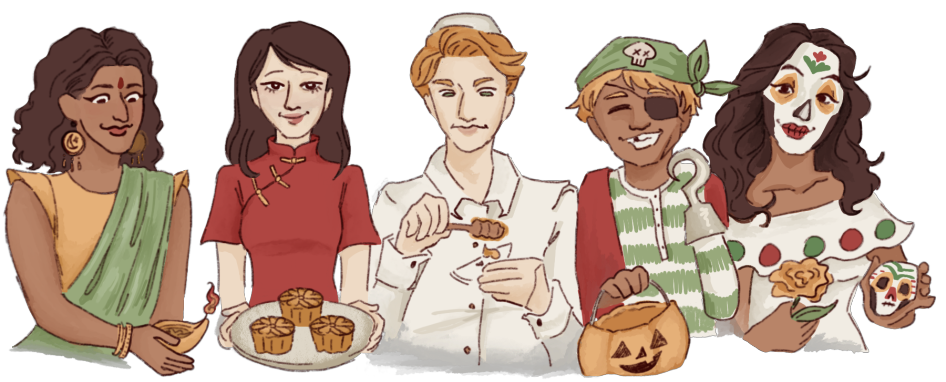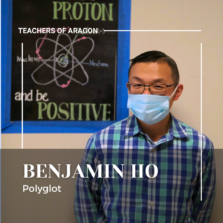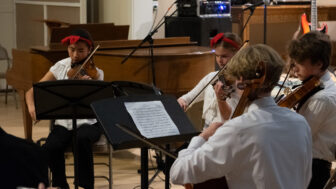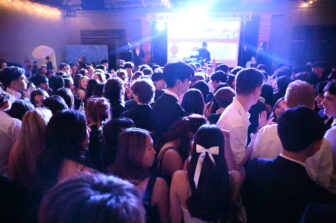
Alexa Sterry
Throughout the year, the Aragon community celebrates holidays with religious or cultural significance. While holidays are celebrated all year round, many holidays are celebrated in the fall. One such holiday is Rosh Hashanah, the Jewish New Year, which senior Mia Weinberger celebrates with her grandparents. Rosh Hashanah follows specific traditions, such as eating apples and honey to signify the sweetness of the new year.
When I was younger, [missing school] was my favorite thing
“We would light the candles and my grandfather would [say] prayers,” Weinberger said. “[On] my first Rosh Hashanah, … when [my grandmother] dipped her bread in honey, I was just eating the bread plain.”
For some holidays, such as Rosh Hashanah, students must miss school to celebrate.
“I’m not allowed to work or do anything that takes away from thinking about the holiday and spending time with family,” said junior Eliana Rose. “When I was younger, [missing school] was my favorite thing because I was able to leave. … Over time I’ve missed less days. My mom has gotten less strict on how many days we miss because there’s so much work to make up.”
Holidays that do not have days off force a balance between working and celebrating the holiday. One of these holidays is Diwali, or the Festival of Lights, a Hindu festival celebrating the victory of good over evil.
“It’s easier to celebrate on a weekend,” said junior Anish Dara. “Otherwise, I usually try to finish my work early because [most of the] celebrations happen during nighttime. Some days are more like a festival, but sometimes you [celebrate] at home by praying.”
Sometimes I wish I could live a full Chinese experience
The Chinese Mid-Autumn Festival takes place on the 15th day and eighth month of the Chinese Calendar, celebrating the end of the Autumn Harvest with a full moon. A food eaten during the Mid Autumn Festival is the mooncake, a confectionery filled with sweet bean paste, lotus or winter melon with a soft crust on the outside.
“I gather with my cousins, aunts, uncles and my grandpa,” said junior Melody Chen. “We enjoy watching the moon, eating mooncakes and when I was younger I would have crackling fireworks that I would throw on the ground.”
For those who celebrate them, cultural holidays can be important for maintaining one’s cultural identity, especially when someone is living elsewhere from the origin of their culture.
“A lot of times I do feel distant from the Chinese side of me,” Chen said. “I don’t have the experience of a Chinese person, and my parents grew up in a different culture so we’re really different. Sometimes I wish I could live a full Chinese experience, which is why having the Mid-Autumn Festival here is really nice.”
The most popular holiday celebrated in America during this time is Halloween, where students both enjoy giving and getting candy when participating in Trick or Treating. Other Halloween traditions include dressing up in costumes for Halloween or participating in pumpkin carving.
… I love giving candy to kids because I love seeing their cute costumes
“I make plans to go trick or treating around my neighborhood because everyone in my neighborhood put out really good candy,” said sophomore Gwen Johnson. “There’s also someone that gives out ice cream instead of candy, so I’m planning to head there first. If I’m tired on [Halloween], I stay home and give out candy because I love giving candy to kids because I love seeing their cute costumes.”
The day after Halloween, many celebrate Día de Los Muertos, or the Day of the Dead, a holiday originating from Mexico to bridge together the living and the dead. Families set up altars to give offerings for ancestors, consisting of the ancestor’s favorite foods or sentimental items such as charms, jewelry and sugar skulls. Senior Ariana Gavidia, who celebrates this holiday, believes in not only preserving one’s own cultural identity, but passing on the tradition between generations.
“It’s nice to honor people who have passed away, especially by keeping the memory of them alive,” Gavidia said. “Telling [younger generations] that didn’t know the ancestor … more about their family is important to help connect the past and present.”
With so many fall holidays, students have plenty of opportunities to connect with their culture.




